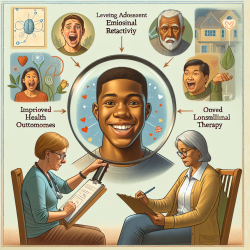Understanding the Link Between Adolescent Emotional Reactivity and Adult Health
Recent research has highlighted the importance of addressing emotional reactivity and somatic symptoms during adolescence to foster better health outcomes in adulthood. The study titled Negative Emotional Reactivity and Somatic Symptoms during Adolescence Predict Adult Health and Wellbeing in Early and Middle Adulthood provides valuable insights into how these adolescent traits can influence long-term wellbeing.
Key Findings from the Research
The study, conducted over several decades, followed participants from ages 12 to 16 and then again at ages 35 and 45. It found that:
- Adolescents with higher levels of somatic symptoms and negative emotional reactivity were more likely to report similar issues in adulthood.
- Individual differences in the level and change of these traits during adolescence were independently associated with adult health outcomes.
- Adolescent girls reported higher levels of somatic symptoms and emotional reactivity than boys, which persisted into adulthood.
Implications for Practitioners
For practitioners, especially those involved in speech-language pathology and online therapy services like TinyEYE, these findings underscore the importance of early intervention. By addressing emotional reactivity and somatic symptoms during adolescence, practitioners can help set the stage for healthier adult lives. Here are some strategies to consider:
- Implement Emotional Regulation Interventions: Teaching adolescents how to manage their emotional responses can reduce the impact of negative reactivity on their health.
- Monitor and Address Somatic Symptoms: Regular check-ins with adolescents to discuss physical symptoms can help identify patterns and provide early intervention.
- Promote Healthy Lifestyle Choices: Encourage activities that promote physical and mental health, such as exercise, proper nutrition, and stress management techniques.
Encouraging Further Research
While this study provides a comprehensive look at the long-term effects of adolescent emotional reactivity and somatic symptoms, there is still much to learn. Practitioners are encouraged to engage in further research to explore:
- The specific mechanisms through which emotional reactivity influences adult health.
- How interventions can be tailored to different demographic groups, considering gender and cultural differences.
- The role of digital interventions in modifying emotional reactivity and improving health outcomes.
Conclusion
By integrating the findings from this research into practice, practitioners can play a pivotal role in improving the long-term health and wellbeing of their adolescent clients. Early interventions that focus on emotional regulation and somatic symptom management can pave the way for healthier adult lives.
To read the original research paper, please follow this link: Negative Emotional Reactivity and Somatic Symptoms during Adolescence Predict Adult Health and Wellbeing in Early and Middle Adulthood.










